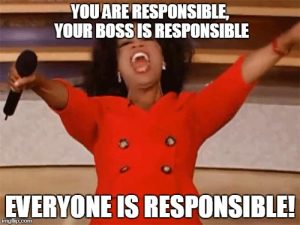If you close your eyes and think about your ideal workplace, what do you see? how is it? who else is there?
Colorful walls?
A private office?
A Foosball table? Ping Pong?
Gluten free snacks?
Your own personal Starbucks barista? (I stand by all my fellow Starbucks addicts of the world)

All these responses are part of a thing called Company Culture, but culture is something much more deeper than decorating walls or having the company logo all over the place. So, then, what is company culture? And no, it’s not a millennial thing…
Here are some definitions:
Culture is composed of the prevailing beliefs, behaviors, and assumptions of an organization. These serve as a guide to what are considered appropriate or inappropriate behaviors of individuals and groups. Culture provides a means of understanding strategic decisions, which allows expectations to develop.
Mmmmm.. a little too “corporate” don’t you think?

What about this:
It’s about creating a unique yet unified environment that will reflect your company and its team. It should be a place where people feel supported and inspired; a place where your employees, clients and visitors will feel welcomed and engaged. (https://www.business.com)
Or this:
Culture = Behavior. Culture is a word used to describe the behaviors that represent the general operating norms in your environment. Culture is not usually defined as good or bad, although aspects of your culture likely support your progress and success and other aspects impede your progress. (https://www.thebalance.com)
Culture is the environment that surrounds you at work all of the time. Culture is a powerful element that shapes your work enjoyment, your work relationships, and your work processes. But, culture is something that you cannot actually see, except through its physical manifestations in your workplace. (https://www.thebalance.com)
Now, it starts to make sense, right?
For my pragmatic friends, I also have a good one:
“Your culture is the behaviors you reward and punish.” (Charles O’Reilly, https://jocelyngoldfein.com)
This is the point in time in which I ask you: what do you think about your company’s culture, what do you like the most? what is it that you don’t like? or even better, do you think there’s a company’s culture in your workplace? Keep your answers in the back of your mind we’ll come back to them later …
Some of you will be bored by now and are probably thinking that it makes no sense to talk about this, or that it’s just a waste of time, but if instead you think for a moment, that this is about you being happy, comfortable and motivated at work and that this will definitely translate into being happy in your life out of your workplace.
I have heard a lot of times things like: “as long as I get my paycheck on time, I’m fine”… is this really true? If so, then why some of these people look for a different job or complain everyday about everything? To me, this means that they’re definitely and most-likely not fine!
At some point, you will start to evaluate (consciously or unconsciously) your workplace and work conditions:
Does the company know who you are and what you do?
Do you feel motivated at work?
Do you see a career path for you?
Do you feel like you really are ‘part of the team’?

Believe me, there comes a time when a good and on time paycheck is not enough… thus, before you start blaming someone, take a deep breath and evaluate your position in your company, because if you’re not new there, then it’s very possible my dear reader, that you’re partially responsible for your company’s culture, whether it’s a terrible company culture or there’s no company culture at all.
Why do I say this you might ask, because culture is not a “one person” thing, one person can’t create the company’s culture alone, employees must try to create a good work environment, determine how work is done or how decisions are taken. Also, employees are responsible for transmitting this “way of thinking” to the new members of the company, and keep in mind that we’re talking about behavior, don’t mix this with telling new guys what their work schedule is or where is the cafeteria.
Therefore, who is responsible for a company´s culture? the CEO is responsible, the managers are responsible, employees are responsible… Everyone is responsible!

Culture doesn’t suddenly appear from one moment to another, most companies hire experts to evaluate their status quo, interview key persons, understand the company values and with this information, develop an action plan for the company, but then again, everyone is responsible for following the plan, which is easy to say, yet not so easy to apply.
“When role models are consistent, everyone gets the message”. (https://jocelyngoldfein.com) That is how culture is transmitted.
- Are you receiving the message in your company?
- Is it a clear message?
- Do you sympathize with it?
Culture is very powerful, it determines the path of a company, but at the same time, it’s very frail… it only takes a little inconsistency to lose it.
Alas, be careful: “If you didn’t build a consistent culture of humility, you failed to build an immune system against arrogance” (Jocelyn Goldfein).
Now, back to my questions above:
What do you think about your company’s culture, what do you like the most?
What is it that you don’t like?
What do you think can be improved?
Are you raising your hand on things that you don’t like or are you suffering in silence (and looking for a new job…)?
Leave your responses in the comments section below, and don’t worry, your identity will be protected!



